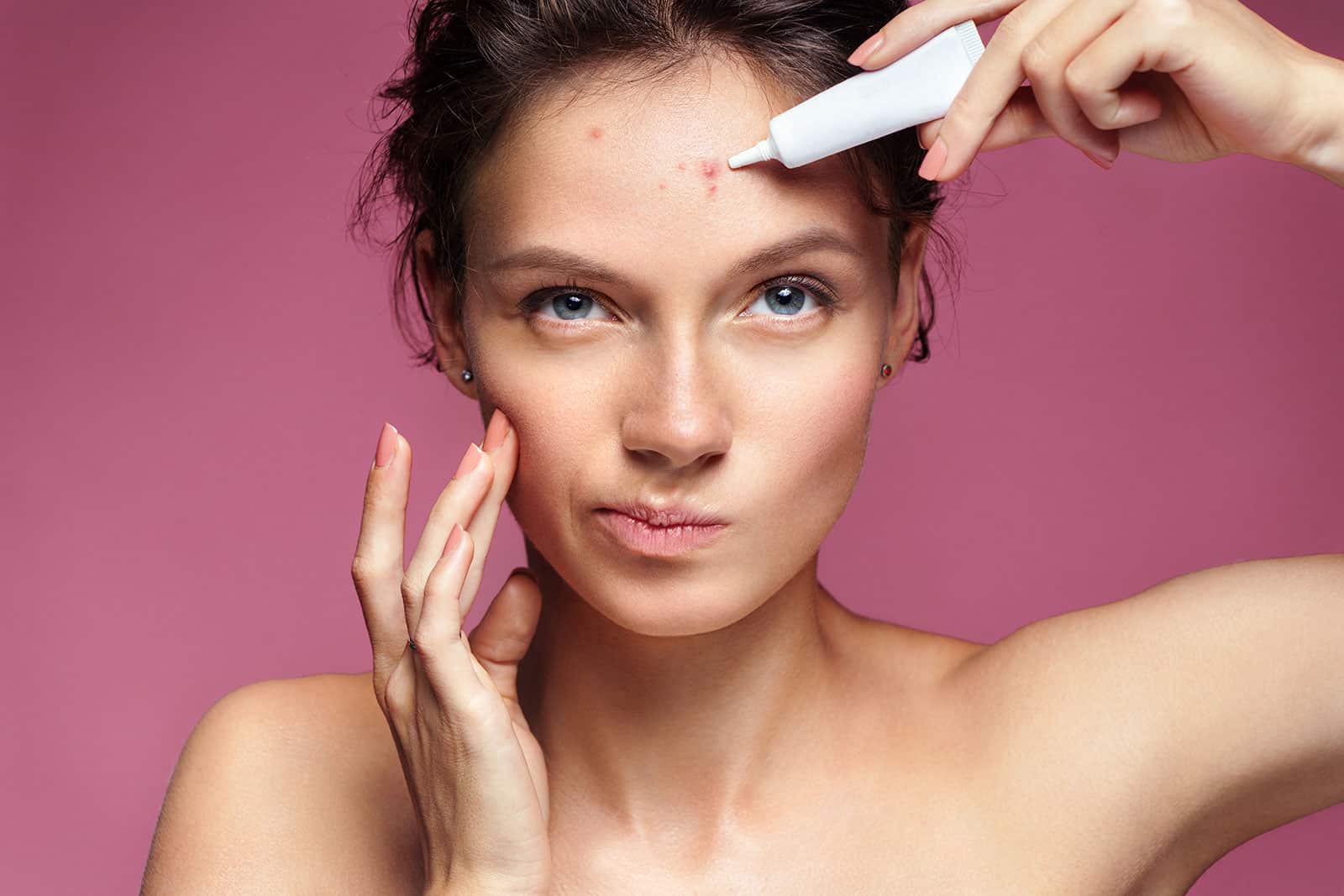
Accutane and Alcohol
Home / Blog / Detox / Alcohol / Accutane and Alcohol
TL;DR – Mixing Accutane (isotretinoin) and alcohol is not recommended. Both can stress the liver and increase the risk of liver damage. Always consult a doctor before combining any medications with alcohol.
Table of Contents
What is Accutane?
Accutane is the brand name for the drug isotretinoin, which is a derivative of Vitamin A. The brand Accutane is no longer available in the United States, but many people still refer to isotretinoin by this more familiar brand name. Accutane is a powerful prescription medication used to treat severe acne that has been unresponsive to antibiotics like Tetracycline. Accutane is very effective and shows significant results at clearing acne for most patients. It outperforms antibiotics, showing marked and long-lasting improvement. There are side effects with Accutane, but these are easily managed with medical supervision and typically don’t cause major issues.

Accutane improves acne by decreasing oil production, helping unclog pores, and also decreasing inflammation. While the patient is taking Accutane, oil production is reduced, then returns to normal after you stop taking it. What’s surprising, however, is that the acne improvement continues even after Accutane is stopped and the oil production returns to its normal levels.
A typical course of treatment is a four to six month prescription. Accutane is provided in table form and should be taken with food. It takes a few months to work, so you likely won’t see improvement until your third or fourth month. Some people don’t notice major improvements until after the treatment course.
Common Side Effects
The most common side effects are related to the decreased oil production. This can lead to dry skin and dry lips, both of which are easily countered by lotion or lip balms. Some patients experience dry nose and nose bleeds, and your eyes may feel dry. If you wear contact lenses, you might require eye drops. The dryness goes away after you stop taking Accutane.
There have been reports of less common side effects, including increased cholesterol, joint and muscle aches, depression and suicidal thoughts, and links to Inflammatory Bowel Disease, Crohn’s Disease, and Ulcerative Colitis. Accutane can also cause birth defects or premature birth, and should not be taken while pregnant. The risks are serious enough that anyone who could become pregnant will require additional tests to ensure you’re not pregnant and will not become pregnant during treatment.
Recognizing signs of a potential negative interaction
Some serious side effects of Accutane can have permanent or long-term effects. However, most of these are quite rare. Severe side effects that require immediate medical attention include:
- Allergic reactions such as hives, swelling, or difficulty breathing.
- Diabetic or blood sugar symptoms such as severe thirst, frequent urination, blurry vision, or increased tiredness.
- Anemia symptoms such as weakness, extreme tiredness, dizziness, cold hands and feet, and pale skin.
- Serious mental health changes such as depression, suicidal thoughts, hallucinations, uncontrollable crying, or increased aggression.
Can you combine alcohol and Accutane?
If you’re using Accutane or considering starting use, you may have questions about whether you can safely drink alcohol while taking Accutane. The easy answer is “no.” Most medical professionals and dermatologists advise that is not safe to mix Accutane and alcohol. Many of the risks and side effects of Accutane, such as liver damage and dehydration, are also risks and side effects of alcohol use. When combined, alcohol and Accutane can amplify these effects. For example, long-term use of Accutane can cause liver damage, and if you combine alcohol, it can double your changes of developing liver problems. For some people, Accutane can increase your triglycerides and cholesterol, which alcohol can also increase. Other amplified side effects include dehydration, mood and mental health, and gastrointestinal problems such as bowel or stomach issues.
If your healthcare provider is prescribing Accutane, be honest about your alcohol consumption. Your provider may have recommendations about limiting or eliminating alcohol consumption, and they may recommend regular tests concerning your liver function. Your individual situation will vary, but we recommend safety first when considering using alcohol while on Accutane.
Alternative Acne Treatments
Your provider may also consider an alternative acne treatment depending on your overall alcohol consumption. If you and your provider decide that Accutane is not right for you, other options include:
Topical retinoids
Accutane is a type of retinoid, but there are other types available, including Retin-A (tretinoin), Tazorac (tazarotene), Differin (adapalene), and Aklief(trifarotene). These retinoids also work to unclog pores and regulate new skin cell growth. Unlike Accutane, however, these are topical retinoids, which means they’re applied directly to the skin instead of taken internally. They also have fewer side effects than Accutane. As with Accutane, you shouldn’t use these retinoids if you’re pregnant.
Topical retinoids are less expensive than Accutane, but they can still be more expensive than other options. Some insurance may cover retinoids, and generic options are available for some medications. Differin also offers are lower dosage over the counter at a less expensive cost.
Antibacterial medications
These medications kill the acne-causing bacteria living in your pores. Antibiotics can be prescribed in pill or topical form, they’re less expensive than retinoids, and insurance may cover treatments. However, for severe acne, they may not be effective, and they have their own set of risks and side effects. Long-term use of antibiotics can cause the bacteria to become resistant, some people experience stomach upsets, and sun sensitivity is another risk. Common antibiotics prescribed for acne include tetracyclines, macrolides, sulfonamides, and sulfones.
Benzoyl peroxide is another over the counter option which is usually very inexpensive. It’s available in topical lotions, face and body washes, creams, and gels. For mild acne, benzoyl peroxide may work on its own, but for more serious cases, your healthcare provider may recommend adding a retinoid, as they work better together than alone.
Hormonal treatments
Females may also consider hormonal acne treatments as hormone changes during period cycles and menopause can cause acne breakouts. Hormone treatments work by controlling certain hormone levels in your body that cause cause your body to produce excess oil.
Conclusion
Regardless of what medication you take, it’s important to be informed about risks, side effects, and interactions with other drugs such as alcohol. It’s equally important to be honest with your provider about your health and alcohol intake to ensure you receive an appropriate prescription. Ongoing communication with your provider is key to managing any potential side effects and determining whether it’s safe to continue treatments.
Are You Struggling with Alcoholism?
The mission of Live Free Recovery Services and structured sober living Homes in New Hampshire is to help men and women recover from chronic drug and alcohol addiction. We do this through the multiple pathways to recovery, the 12-steps, and a Medicated Assisted Treatment philosophy.
At Live Free Recovery, we specialize in sober living homes. We also offer outpatient forms of drug rehab. We focus on treating the whole person, including mental and physical health, which we find makes patients less likely to relapse.
Here at Live Free Recovery, we offer three specific drug rehab programs:
- Inpatient Treatment, where patients live at a treatment center 24/7 during the initial rehab program.
- Partial Hospitalization Program (also known as Day Treatment), where patients attend rehab for approximately five to eight hours a day, five to seven days a week.
- Sober Living programs, which provides a safe transition plan after inpatient treatment.
If you or a loved one are struggling with alcohol use, we’re here to help. Call us today
Published on: 2023-10-18
Updated on: 2024-02-16
